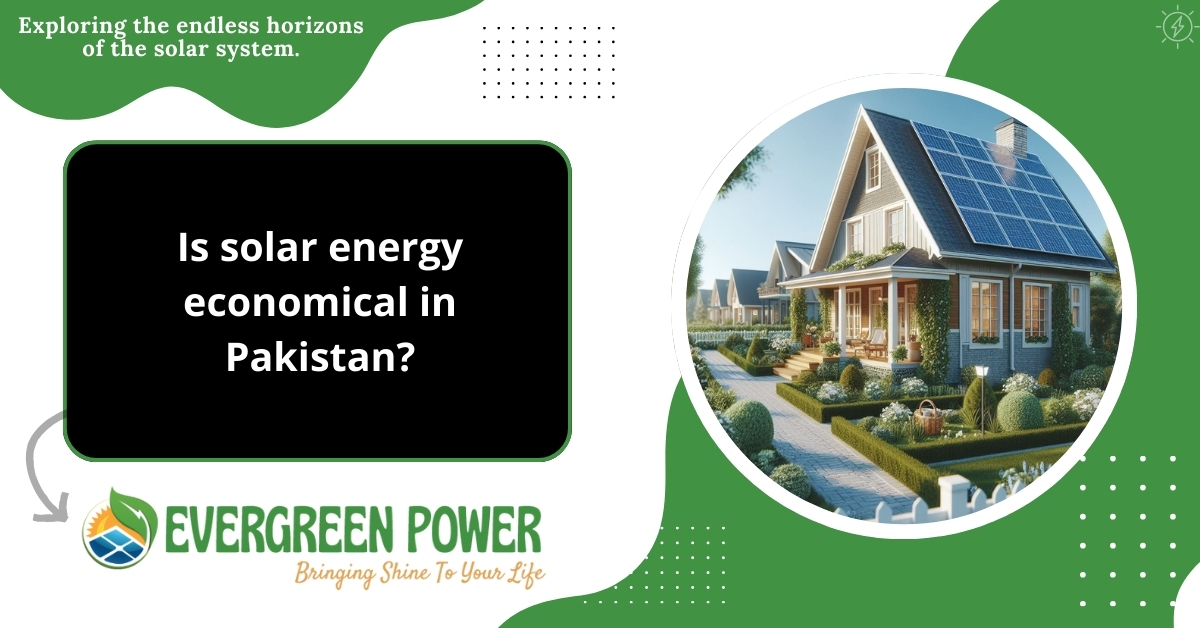Explore the intricate details of solar energy economical in Pakistan, including its economic feasibility, benefits, and FAQs. Discover how solar power can revolutionize the country’s energy landscape.
Pakistan, like many nations, is grappling with the challenges of meeting its rising energy demands while ensuring environmental sustainability. In this pursuit, solar energy emerges as a beacon of hope, offering a renewable and abundant source of power. This comprehensive guide delves deep into the economic viability of solar energy in Pakistan, examining its potential, benefits, and addressing common queries to shed light on this transformative energy solution.
Understanding Pakistan’s Solar Energy Potential:
Pakistan is blessed with an abundance of sunlight throughout the year, especially in its southern regions. This solar potential presents a significant opportunity for the country to harness renewable energy and reduce its reliance on fossil fuels. With an average of over 300 sunny days annually, Pakistan stands poised to tap into this vast resource for sustainable development.

Why Consider Solar Energy in Pakistan?
Pakistan boasts exceptional potential for solar power generation. Here’s why:
- Abundant Sunshine: The country receives an average of 7-8 hours of sunlight daily, a perfect fuel source for solar panels.
- Reduced Reliance on Fossil Fuels: Transitioning to solar reduces dependence on imported fuels, saving foreign exchange and mitigating price fluctuations.
- Hedge Against Inflation: Unlike fossil fuels with ever-increasing costs, solar panels offer a one-time investment with minimal maintenance expenses.
- Improved Energy Security: Solar power plants contribute to a more stable and reliable energy supply, especially in remote areas.
How Solar Energy Works
Step 1: The Sun’s Gift
Picture this: the sun, our celestial powerhouse, beams its radiant energy towards Earth, traversing through the vastness of space. But as it enters our atmosphere, some of its energy, like those pesky ultraviolet rays, gets filtered out. What remains, however, are the precious solar rays, primed for action.
Solar energy is the wizardry of harnessing these sunbeams to conjure electricity. Over the last half-decade, it’s skyrocketed in popularity, becoming the darling of renewable energy aficionados worldwide. Enter stage left: solar panels, those sleek marvels designed to soak in sunlight and work their magic.
Step 2: The Magic of Photovoltaic Cells
Now, let’s zoom into the heart of solar power: photovoltaic cells. These little champions are the frontline soldiers in the battle for clean energy supremacy. Sporting a positive and negative charge, they’re like tiny powerhouses waiting to spring into action.
You might have heard them called solar panel cells, solar cells, or just cell plates – different names, same game. Picture this: photons, those tiny packets of light energy, rain down on these cells like confetti. The silicon within eagerly slurps them up, liberating electrons in the process. And voila! We have electricity coursing through wires, a direct current (DC) in the making. But hold your horses, we’re not done yet.
Step 3: The Thermal Tango
Meanwhile, in another corner of the solar stage, we have solar thermal, the lesser-known sibling in our renewable energy family. Here, instead of producing electricity directly, we’re heating things up – quite literally.
When solar rays kiss the surface of water or oil, things start to sizzle. For large-scale operations, it’s usually oil that gets the hot treatment. This fiery liquid then goes on to generate steam, which in turn powers turbines and other mechanical marvels, spinning them into electricity-producing action.
But here’s the rub: solar thermal isn’t a cheap date. It takes time to set up, demands a pretty penny upfront, and comes with its fair share of operational overheads. Raw materials don’t come cheap, and that cost inevitably trickles down to us, the consumers.
Yet, amidst the grandeur of large-scale operations, there’s a simpler tale unfolding – one of heating water for humble abodes in rural nooks. Here, solar water heaters offer a cost-effective solution, though they may not churn out electricity by the gigawatt.
In essence, solar energy is a symphony of sunlight and science, a tale of innovation and adaptation in the pursuit of a cleaner, greener tomorrow. So, the next time you bask in the warmth of the sun, remember: it’s not just light and heat; it’s potential energy waiting to be tapped.
6 Benefits of Solar Energy Adoption:
- Cost Efficiency: While the initial investment in solar energy systems may seem daunting, the long-term benefits far outweigh the upfront costs. By generating electricity from sunlight, solar power offers substantial savings on utility bills over the system’s lifespan.
- Environmental Sustainability: One of the most compelling reasons to embrace solar energy is its positive impact on the environment. Unlike traditional fossil fuels, solar power produces no greenhouse gas emissions or air pollutants, contributing to cleaner air and mitigating climate change.
- Energy Independence: Solar energy provides a pathway to energy independence by reducing reliance on imported fuels and volatile energy markets. By generating electricity locally, communities and businesses can assert greater control over their energy supply and costs.
- Protection Against Inflation: In a world where fossil fuel prices fluctuate like a rollercoaster ride, solar energy stands as a stable and cost-effective alternative. Unlike traditional energy sources, solar panels require only an initial investment, offering long-term energy security without the fear of skyrocketing electricity bills. By embracing solar power, Pakistan can shield itself from the volatile energy market and pave the way for a more stable economic future.
- Rural Electrification: In rural areas with limited access to the national grid, solar energy offers a lifeline for electrification. Off-grid solar solutions empower remote communities with access to clean and reliable electricity, unlocking new opportunities for education, healthcare, and economic empowerment.
- Technology Advancement: The pursuit of solar energy drives technological innovation, leading to improvements in solar panel efficiency, energy storage, and grid integration. These advancements not only enhance the economic viability of solar energy but also pave the way for a more sustainable energy future.

Long-Term Economic Benefits of Solar Energy
- Reduced Electricity Bills: Solar panels significantly offset your reliance on the national grid, leading to substantial savings on electricity bills in the long run.
- Increased Property Value: Homes equipped with solar panels often fetch a higher market value due to their energy efficiency.
- Low Maintenance Costs: Solar panels require minimal maintenance, further enhancing their economic appeal.
- Environmental Benefits: By reducing dependence on fossil fuels, solar power contributes to a cleaner environment and reduced greenhouse gas emissions.
Government Initiatives Promoting Solar Energy
The Pakistani government recognizes the potential of solar energy and has implemented several initiatives to promote its adoption:
- Subsidies: Subsidies are offered for the installation of solar panels, making them more affordable for residential and commercial sectors.
- Net Metering Policy: This policy allows individuals to sell excess solar energy back to the grid, earning credits that reduce their electricity bills.
- Tax Exemptions: Tax exemptions are offered on the import of solar equipment, further reducing costs.
Factors Influencing Solar Energy Economics in Pakistan:
- Initial Investment: The upfront cost of installing solar panels and associated equipment remains a significant barrier for many individuals and businesses. However, declining solar panel prices, coupled with government incentives and financing options, are making solar energy more accessible and affordable.
- Policy Support: Government policies play a crucial role in shaping the economic landscape for solar energy in Pakistan. Policies such as net metering, feed-in tariffs, tax incentives, and renewable energy targets incentivize investment in solar power infrastructure and drive market growth.
- Tariff Structure: The structure of electricity tariffs and grid connectivity fees can impact the financial returns on solar energy investments. Net metering policies, which allow solar energy system owners to sell excess electricity back to the grid, enhance the economic viability of solar installations.
- Maintenance Costs: While solar energy systems require minimal maintenance compared to traditional power plants, periodic inspections and cleaning are necessary to ensure optimal performance and longevity. Factoring in maintenance costs is essential for accurately assessing the economic returns on solar investments.
- Energy Consumption Patterns: Understanding the patterns of energy consumption is critical for sizing solar installations appropriately. By analyzing historical energy usage data and considering future demand projections, stakeholders can optimize the design and placement of solar energy systems for maximum efficiency and cost savings.
- Technological Advancements: Advances in solar technology continue to drive down costs and improve the efficiency and reliability of solar energy systems. Innovations in photovoltaic cell design, energy storage technologies, and smart grid integration hold the promise of further enhancing the economic viability of solar energy in Pakistan.
Economic Impact of Solar Energy Adoption
- Reducing Dependence on Imported Fossil Fuels: By embracing solar energy, Pakistan can decrease its reliance on costly imported fossil fuels, conserving valuable foreign exchange reserves.
- Redirecting Resources Towards Development: The savings from reduced fossil fuel imports can be redirected towards critical developmental projects, fostering economic growth and infrastructure development.
- Stimulating Local Economies: The growth of the solar energy sector creates a ripple effect, generating job opportunities and stimulating local industries, particularly in manufacturing, installation, and maintenance.
Forge Ahead with International Cooperation
- Partnerships with Global Organizations: Pakistan has forged strategic partnerships with international entities such as the World Bank, Asian Development Bank, and UNDP to access funding, technical expertise, and knowledge-sharing opportunities.
- Leveraging Knowledge from Solar-Savvy Nations: Collaborations with leading solar energy nations like China, Germany, and the United States have facilitated the transfer of technology and best practices, enhancing Pakistan’s solar infrastructure and implementation strategies.
Shining Bright: The Future of Solar Energy in Pakistan
- Increasing Awareness and Supportive Policies: Growing awareness about the benefits of renewable energy, coupled with supportive government policies, sets the stage for accelerated adoption of solar power across Pakistan.
- Declining Costs, Rising Accessibility: As technology advances and economies of scale are achieved, the cost of solar panels and installation continues to decline, making solar energy a more accessible and cost-effective option for individuals and businesses.
- Expanding Reach and Impact: With the declining costs and advancing technologies, solar energy is poised to reach remote areas and off-grid communities, providing access to reliable electricity and driving socio-economic development.
Innovating Towards Sustainable Solutions
- Research and Development Initiatives: Ongoing efforts focus on enhancing the efficiency of solar panels, developing energy storage solutions, and improving grid integration technologies.
- Pioneering Solutions for a Sustainable Future: Through innovation and collaboration, Pakistan aims to pioneer sustainable solutions that not only address its energy needs but also contribute to global efforts in combating climate change.

FAQs about solar energy economical in Pakistan
Is solar energy economically viable in Pakistan?
Yes, solar energy is economically viable in Pakistan, thanks to abundant sunlight, decreasing costs, and supportive government policies.
What are the benefits of switching to solar power?
Switching to solar power offers cost savings, environmental sustainability, energy independence, job creation, rural electrification, and technological advancement.
How do government policies support solar energy adoption?
Government policies such as net metering, feed-in tariffs, tax incentives, and renewable energy targets incentivize investment in solar power infrastructure.
What factors should I consider before investing in a solar energy system?
Consider factors such as initial investment costs, policy support, tariff structure, maintenance expenses, energy consumption patterns, and technological advancements.
How long does it take to recoup the initial investment in a solar energy system?
The payback period for a solar energy system depends on factors such as system size, energy consumption, local sunlight conditions, and financing options, typically ranging from 5 to 10 years.
Can I use solar energy during power outages?
Yes, with the addition of battery storage systems, solar energy can provide backup power during grid outages, ensuring uninterrupted electricity supply for critical loads.
Conclusion:
In conclusion, the economic viability of solar energy in Pakistan hinges on a multitude of factors, including abundant sunlight, supportive policies, technological advancements, and shifting energy dynamics. By embracing solar power, Pakistan can not only address its energy challenges but also usher in a new era of sustainable development and prosperity. With careful planning, strategic investments, and community engagement, solar energy has the potential to transform Pakistan’s energy landscape and pave the way towards a brighter, cleaner, and more prosperous future.
Visit our Site:
Welcome to Evergreen Power Ltd – your go-to destination for solar solutions. With over five years of experience in solar and renewable energy, we’re dedicated to providing the most cost-effective panels on the market.
We prioritize environmental sensitivity and offer personalized solutions to meet your needs. Join us in saving the planet – contact us today!
Phone: 0300 1819060
Email: info@egpowerltd.com

